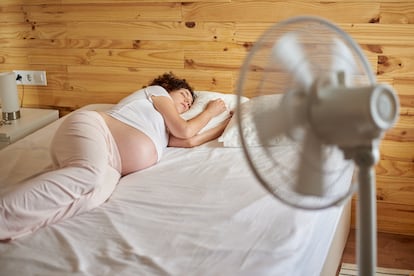Why we sleep worse when it’s hot out and what we can do about it
High temperatures on equatorial nights, which have multiplied in recent years, are associated with less — and less efficient — sleep

Every summer, it gets harder to sleep. Equatorial nights, a European term referring to nocturnal periods during which the temperature remains above 77ºF, multiplied fivefold in 2023 as compared to the historic median between 1991-2020, according to the Sustainability Observatory. In 2023, there were 240 tropical nights in Spain, quite the leap from 179 such nights the previous year.
A 2021 study illustrates the impact of these devilishly hot evenings on our health. Its conclusion: death rates from respiratory and cardiovascular causes rise by 16% in Spain when nighttime temperatures do not drop below 77ºF. There’s also a notable impact on one of the pillars of bodily health: sleep. A systematic review carried out by ISGlobal Barcelona, published in June, concluded after analyzing 36 studies from over the last three decades that higher temperatures are linked worldwide to shorter and less efficient sleep, meaning lower quality rest.
“The rise in environmental temperatures induced by climate change presents a serious threat to sleep and by extension, to human beings’ health, performance and well-being,” states the review. One of the studies included in the report, which was carried out by researchers at the University of Copenhagen and analyzed seven million nights of sleep among 47,000 adults in 68 countries, warned that by the year 2099, we could lose from 50 to 58 hours of sleep a year, the equivalent of nearly two weeks. “There’s no real awareness of the risks and of the impact that temperature has on sleep, nor is there enough information to be able to mitigate that impact,” laments Constanza Vielma, a member of ISGlobal’s research group on climate and health.
How heat makes it difficult to fall asleep
The reason why heat has such a marked impact on sleep is physiological. “Nighttime drowsiness and sleep onset coincide with a drop in body temperature. As bedtime approaches, the blood vessels dilate, mainly in the hands and feet, so there is a loss of body temperature,” says Ana Fernández Arcos, coordinator of the Spanish Society of Neurology (SEN)’s research group on wakefulness and sleep disorders. And of course, as María José Martínez Madrid, coordinator of the chronobiology work group of the Spanish Sleep Society (SES), adds, high temperatures, “interfere with the body’s ability to cool down, which makes it difficult both to fall asleep and stay asleep, since excess heat can cause physical discomfort, sweating and dehydration, which are all factors that interrupt deep and restful sleep.”
Of course, heat doesn’t impact the sleep of all population groups equally. Experts say that those who are most vulnerable are the elderly and small children. The former, because they have less capacity to regulate body temperature and the latter, because they haven’t yet completely developed their temperature regulation system. People with chronic illness are also dramatically impacted, particularly those with cardiovascular, pulmonary or metabolic diseases, which can aggravate thermoregulation problems; as well as people with sleep disorders like insomnia and sleep apnea, whose symptoms can worsen when it’s hot out.
Social health determinants also play an important role when it comes to the impact of heat on sleep. “We know that lower-income countries and people have worse results in this area, given that they have less access to adaptive measures like air conditioning,” says Vielma.
Indeed, air conditioning is one of the adaptive measures recommended by experts when it comes to fighting heat on equatorial and tropical nights, and in maintaining one’s room temperature at the 66ºF to 68ºF degrees considered ideal for restorative sleep. “Air conditioning can help to prepare the bedroom for sleep by reducing its temperature,” says Fernández Arcos, who nonetheless does not recommend keeping the device turned on the entire night, and setting the maximum temperature to 77ºF. “Once sleep has begun, we are less able to regulate our body temperature, especially during the REM sleep stage, which means that excessive cold can cause us to wake up and lead to discomfort in the respiratory tract, muscles, and joints.”
Life beyond air conditioning
The use of air conditioners, according to the previous recommendations and when air is not blown directly on the body, can be useful, but according to the SEN spokesperson, ceiling fans are considered “most effective,” given that they “reduce body temperature more gently by increasing the loss of moisture from the skin.”
But aside from electric apparatuses, there are other steps that people can take throughout the day and night to improve nocturnal slumber. Among them, says Martínez Madrid, are keeping windows and curtains closed during the day to avoid heat; using sheets and pajamas that are made of light, breathable fabrics like cotton and linen, wetting sheets, putting cold compresses on one’s neck, wrist and ankles; trying to sleep in the coolest rooms of the house, if possible at ground level or in the basement; and taking a shower to reduce body temperature and facilitating sleep. Though, regarding this last point, Martínez Madrid says that it’s important that the shower water not be too cold, “because this can have the contrary effect of causing vasoconstriction, which makes it hard to expel heat and can be energizing.”
Fernández Arcos adds other tips like opting for cold and light dinners, hydrating throughout the day, not taking naps that exceed 20-30 minutes, avoiding alcohol consumption (which worsens sleep quality, causing one to wake up frequently, and produces dehydration by increasing night sweats), keeping a spray bottle full of water nearby to be able to spritz oneself when one wakes up and, if it’s impossible to get back to sleep, avoiding staying in bed. “It’s better to get out of bed and carry out a tranquil activity like reading, writing or other tasks, according to one’s preferences. Summer is a season during which more people have difficulty falling asleep and it is important to avoid bad habits, like using electronic devices in bed and above all, avoiding self-medication,” she says.
Though these suggestions are geared toward steps that can be taken by individuals, ISGlobal Barcelona also adds that it is important that governments take adaptive measures, above all in socioeconomically disadvantaged neighborhoods. “Increasing green spaces in urban environments to avoid heat islands, designing and renovating buildings with passive construction solutions, improving housing insulation systems and building ventilation… All these measures are effective and we should try to bring them to the entire population,” says Vielma.
Sign up for our weekly newsletter to get more English-language news coverage from EL PAÍS USA Edition
Tu suscripción se está usando en otro dispositivo
¿Quieres añadir otro usuario a tu suscripción?
Si continúas leyendo en este dispositivo, no se podrá leer en el otro.
FlechaTu suscripción se está usando en otro dispositivo y solo puedes acceder a EL PAÍS desde un dispositivo a la vez.
Si quieres compartir tu cuenta, cambia tu suscripción a la modalidad Premium, así podrás añadir otro usuario. Cada uno accederá con su propia cuenta de email, lo que os permitirá personalizar vuestra experiencia en EL PAÍS.
¿Tienes una suscripción de empresa? Accede aquí para contratar más cuentas.
En el caso de no saber quién está usando tu cuenta, te recomendamos cambiar tu contraseña aquí.
Si decides continuar compartiendo tu cuenta, este mensaje se mostrará en tu dispositivo y en el de la otra persona que está usando tu cuenta de forma indefinida, afectando a tu experiencia de lectura. Puedes consultar aquí los términos y condiciones de la suscripción digital.









































